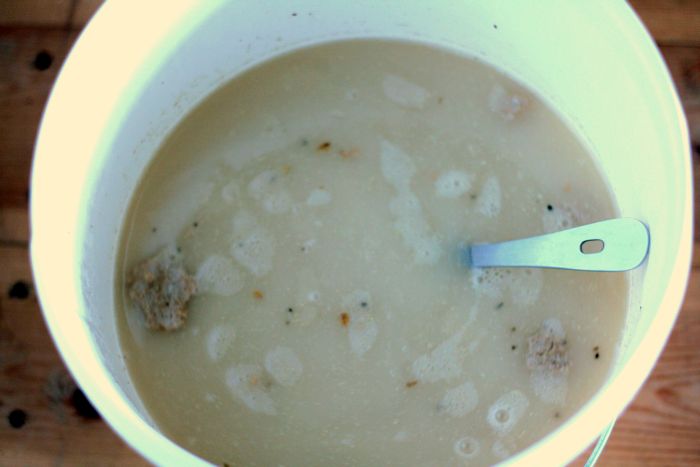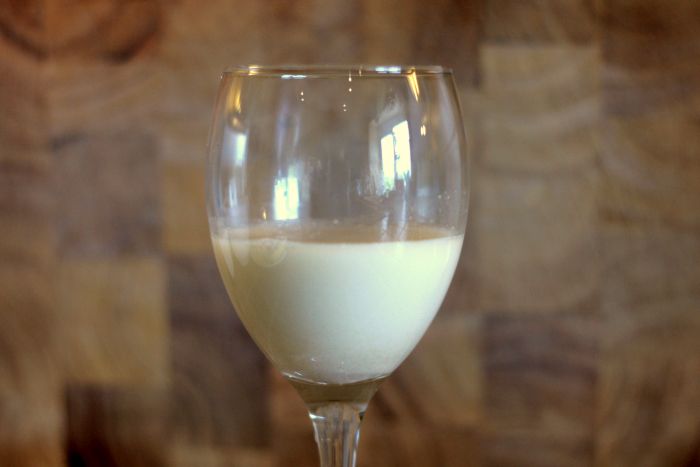I’ve been going a bit wild of late. More specifically, wild fermenting. And it’s all Sandor Katz’s fault. Let me explain.
I bought a Kindle version of Sandor’s book Wild Fermentation. It explains the science and practice of fermenting just about anything. Not only are fermented products tastier & healthier, they’re also a great way of preserving things sustainably. There’s no need for electricity to keep a freezer going, or to put large amounts of energy into heat for canning or bottling. The whole process relies on the ability of wild yeasts to modify the ingredients so they do not spoil. Sauerkraut, or pickled cabbage, is one of the most widely known examples. Another two are beer & wine which also caught my attention. And, of course, there’s sourdough bread which I already have a passion for.
So I’ve thrown myself into a mild fermenting frenzy. On the go is sauerruben (turnips), apple vinegar and T’ej, an Ethiopian-style Honey Wine. I’ll post some more information about these later. Today I want to talk to you about Bouza.
Bouza is a fermented wheat beer which has been made in Egypt since the days of the pharaohs. Its production shows the intimate historic connection between baking & brewing.
There are two preliminary stages: sprouting wheat and making a part-baked sourdough loaf.
The wheat sprouting process converts the starches in the seed into sugars including maltose: hence the term for this process – malting. I put the berries in a big jar and soaked them to get them hydrated. Over the next few days I rinsed & drained them until they had all sprouted. I dried them in a low oven and ground them up in a food processor. Wheat berries are very hard and it took quite a while.
For the sourdough loaf Sandor suggests grinding up wheat berries to make flour. I tried. I even had to put on ear defenders because of the noise the berries made in the food processor and I sharpened the processor blade. Still no joy, so I gave up on that idea. I used the same quantity of organic stoneground wholemeal flour. I mixed this up with the recommended amount of active sourdough starter & water and left it to ferment for two days. I then baked it for 20 minutes in a low oven. The idea with this is that the loaf acts as a convenient store for the natural yeasts. Just baking the loaf a little so it has a firm crust means that it’s transportable and doesn’t need a container to keep it in.
The loaf looked and smelt like an undercooked loaf. The ground sprouted wheat was aromatic. That is, it smelt like old cheese. It wasn’t really very appetising to be honest. But I pressed on.
The next step is to put all the ingredients together, breaking up the loaf and adding a good quantity of water and put in a warm place to ferment for 24-48 hours.
The fermentation got off to a good start and was bubbling away nicely.
As you can see, it looks like something in a latrine and it smelt like a sweet acid. Very attractive. Not.
After a couple of days the fermentation had slowed down considerably. I knew from the book that the beer wouldn’t last long unless refrigerated so it was time to taste.
Here’s my sample:
I expected it to taste like a mildly alcoholic yoghurt drink. It still smelt like aged cheese. I had a small sip. Wow! Euuk. It had a distinct tang to it. The fermentation had produced a really acidic finish to the drink that grabbed the back of my throat. In fact, the sensation and taste was the same as when you throw up. That was enough for me. I didn’t finish the rest of the glass. Frankly, why would I want to drink something that looked like shit & tasted like vomit? Sort of the hangover without the pleasure of getting drunk.
Now I’m prepared to admit that I got something wrong. I used wheat berries that we’d had for a while and use to make wheat bags. So it may not have been as fresh or young as needed. It was certainly the wheat berries that produced the major cheese smell & taste component of the concoction. I could try again with fresh wheat. But I don’t think I have the heart, or the stomach to do so. So a nice experiment and I learnt quite a bit about the science of fermentation, but not a great brewing success.
Watch this blog for further adventures Fermenting Revolution.



Comments
10 responses to “Fermenting Revolution 1 – Bouza experiment”
[…] was intrigued and showed her my Bouza bread beer experiment post. Despite my references to ‘vomit’, Julia changed her mind and took up […]
ROFL
Hi Azelia
It's a lovely and very sustainable cycle in the brewing & baking using natural ferments. Shame that the knowledge is not more widely known and used, we'd not use so many of the world's resources.
Carl 🙂
Enjoyed reading your adventure Carl. Nice description! Vomit…mmm…lovely 😉
The bit of the bread reminds me of my Gran's old bread method of keeping old dough for a week to use as the "levain" for following week's bake, feeding it the night before the baking day.
LOL Yolanda – thanks for that. I sometimes suffer for my art 😉
Enjoy the lemonade, sounds *much* better.
Cheers
Carl
Ewwwww and yuck, that sounds truly revolting. Mind you, I don't even like beer but this takes the biscuit. Bonus points for trying, though.
*sips rose lemonade* Cheers!
Hi Jane
I think that the unsuccessful stuff can be as useful to people as the successful. And it made me laugh 🙂
Rhubarb lemonade sounds very interesting, would like to know more about that.
Cheers
Carl
i like that you posted about an unsuccessful experiment..the closest i've ever been to brewing is making ginger beer and i have a recipe from my mother for rhubarb lemonade that i want to try..she made it every summer and it was delicious..but they are in a different and more basic league to your bouza..jane
Hi Joanna
I don't think I had enough for side effects 🙂
Funnily, it was the herring dish that came to mind when discussion the result of the beer with Debs 😉
Cheers
Carl
I just had a look in my copy of this book. You are a brave man to sup on such food of the gods, Any unexpected side effects ? 😉 Looking this up elsewhere I find similar named beverages but made with maize, I wonder if the type of grain makes a difference. Are you going to pit down some herring for sul stroming too? your beer would be an excellent match for this most delicate of fish dishes.